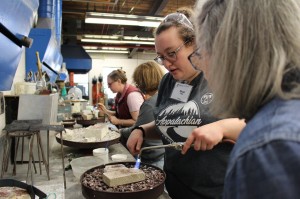By MIKE WEST, Courier Editor
One vote does matter.
At least in the case of Readyville, one vote did make a major difference. Now Readyville is unincorporated and its rival, Murfreesboro, has a population of 118,676. Back in 1811, both communities were vying for the title of county seat.
Boyd Barker shared the community's story during a meeting of PARQ at Readyville Mill. PARQ is an abbreviation of Preserve the Area's Rural Qualities.
A decision was made to relocate the Rutherford County seat from Jefferson due to the decreased navigability of Stones River.
"Charles Ready was very interested in locating the county seat on his property on the Stone River," Barker said. "The federal government was the one who named this place Readyville and they appointed Charles Ready as the first postmaster.
"Ready had great vision for the place that bares his name, including having it chosen as the new county seat of Rutherford County. And his vision almost became reality. However, some of his fellow cou
for property of their own and among them were William Lytle and Hardy Murfree," Barker continued.
"Charles Ready invited the county court to his home and he provided a fine meal for them and that was about in 1811 and that was prior to the construction of The Corners, which was built in the late 1820s.
He lost his bid to have Readyville selected as the new county seat by a one vote margin. Four voted for Murfreesboro and three voted for Readyville, so one vote does matter as we enter into this voting season." he said.
Barker related a story about the selection process that he had heard from a direct descendant of William Lytle.
"He related the following story to me. He said William Lytle and Hardy Murfree were very close friends, both fought in the Revolutionary War and Murfree was Lytle's colonel. Once the decision was made to find a new site for a county seat, both men wanted it on their land, as did Charles Ready. At some point, the decision was made to place it in Murfreesboro and Lytle and Murfree had to make the decision on who's land it would be located. So the decision was made on the basis of a cock fight and Lytle's cock won."
After the death of Hardy Murfree, the decision was made to name the little town Murfreesboro, which later served as capital of Tennessee.
"It is feasible to imagine if Readyville had been selected as county seat, it too would have been named capital of the state of Tennessee during that time frame. Governors Joseph McMinn and William Carroll served as chief executives in Murfreesboro during the 1840s," Barker said.
Murfreesboro had the opportunity to be named the permanent capital of Tennessee. Democratic members of the state house generally favored Murfreesboro, but the Whigs backed Nashville.
"A compromise was reached. Murfreesboro officials only had to pay the $100 to transfer Tennessee's official records to Murfreesboro. It would have been so impressive for the state capital to have been built on a low hill overlooking Murfreesboro," he said. "But local officials refused to pay the $100 and the rest is history. Murfreesboro's capital hill is now home to a huge blue and white water tower instead of William Strickland's beautiful limestone capital."
With that issue settled, Charles Ready turned to his crops which included indigo and fruit trees. He built a grist mill in 1812. He built a single-story brick home one of the first in Middle Tennessee. By 1815, Charles and his wife had 10 children ranging in age from a newborn to age 16. It wasn't until 1829 that he built the new three-story house that stands now.
"He named it, The Corners," Barker said. "A beautiful home that still stands."
The attic was used to cultivate silk worms, but the silk worms did not survive in our climate.
The Ready family continued to grow in prominence. Ready's son, also named Charles, represented Tennessee in Congress.
Originally, located in Rutherford County, Readyville was divided into by the Tennessee state Legislature on Jan. 31, 1836 when Cannon County was formed from portions of Rutherford, Smith and Warren Counties and named in honor of Gov. Newton Cannon.
The younger Ready was the father of Mattie Ready, who married Confederate Gen. John Hunt Morgan.
In February 1862, Morgan established his headquarters in Murfreesboro where he became acquainted with the Ready family and after a brief courtship married Mattie at the Ready home in Murfreesboro during what was one of the major social events of the Civil war.
Barker, himself, is a direct descendant of Charles Ready, who along with his brothers continue to live in Readyville.








